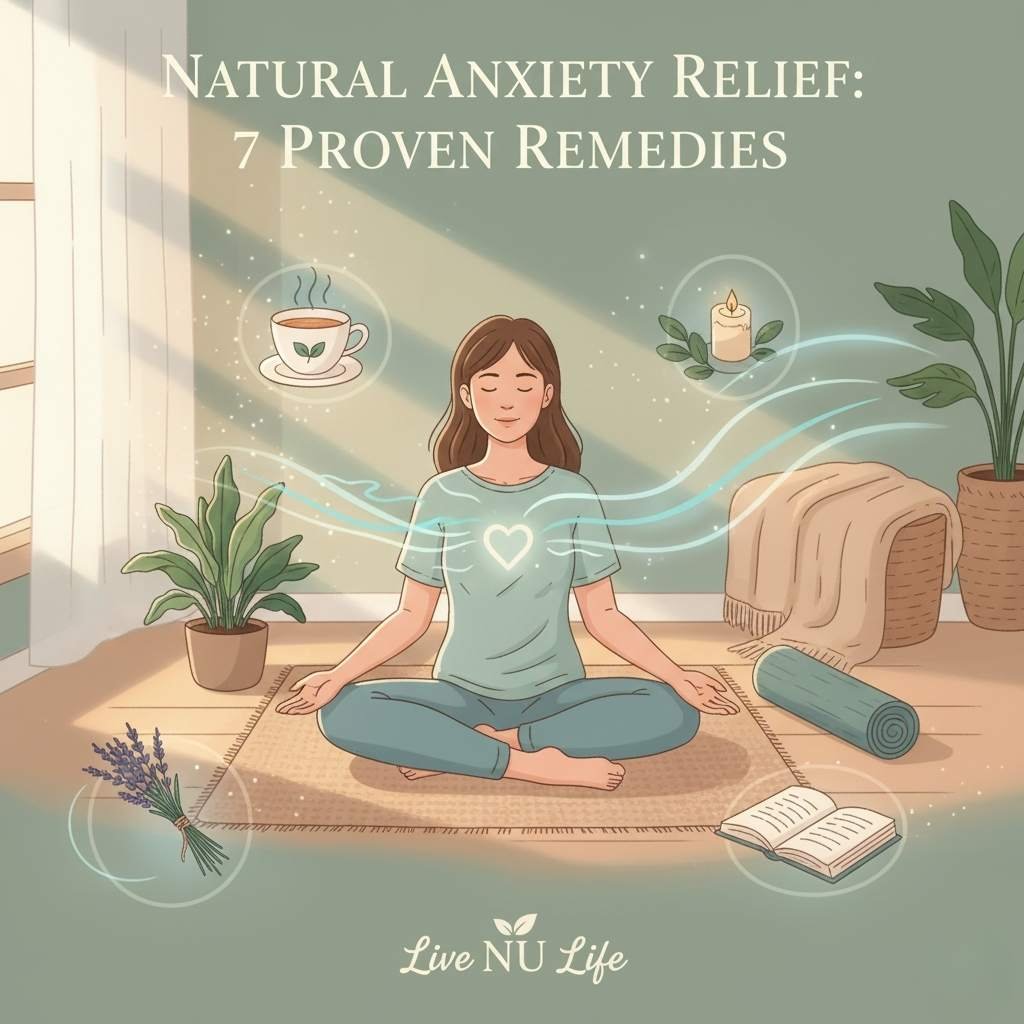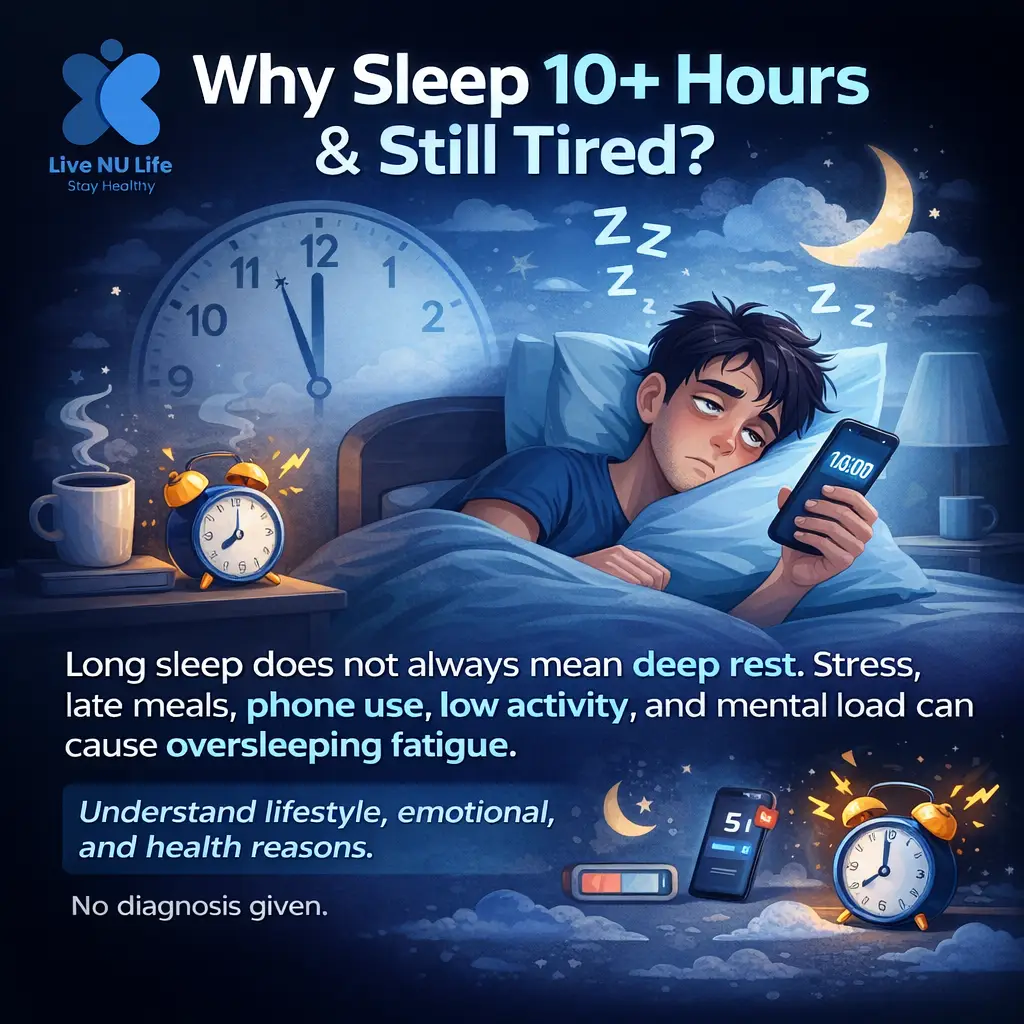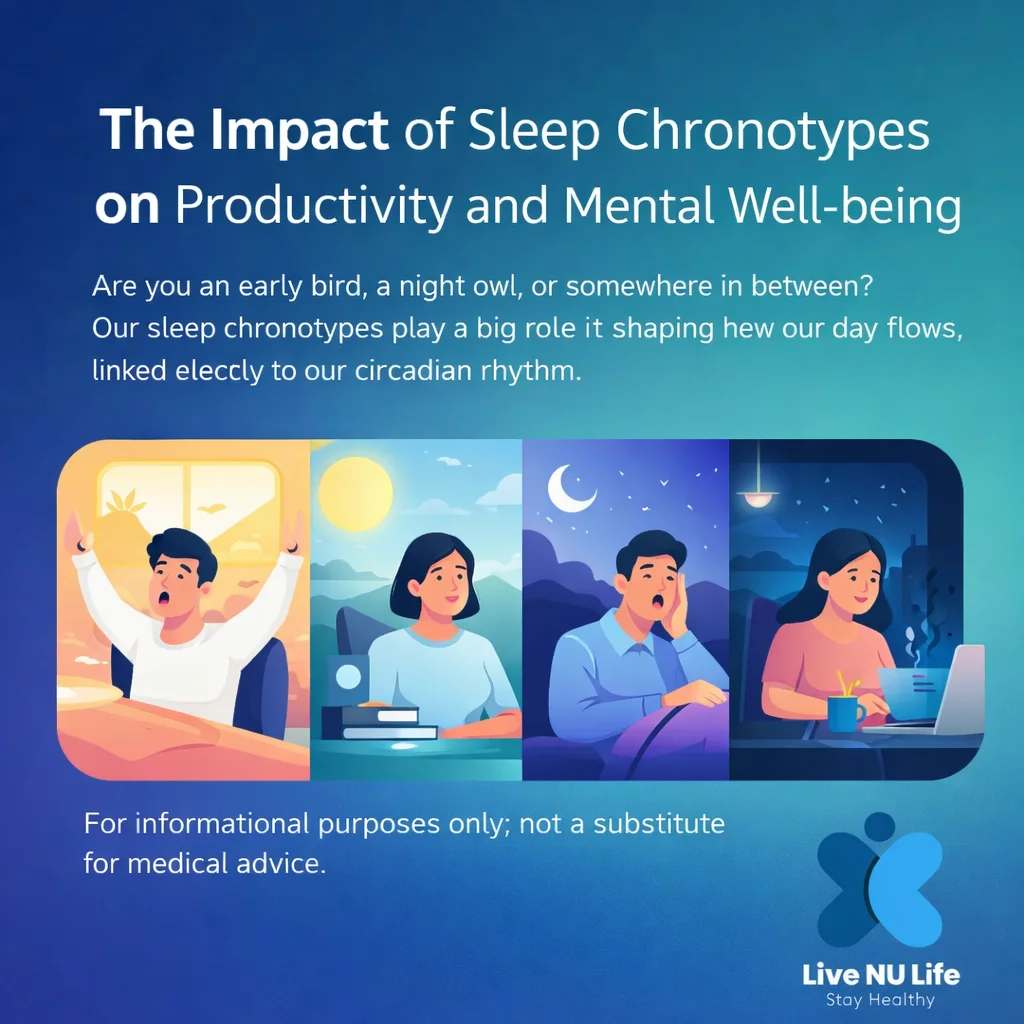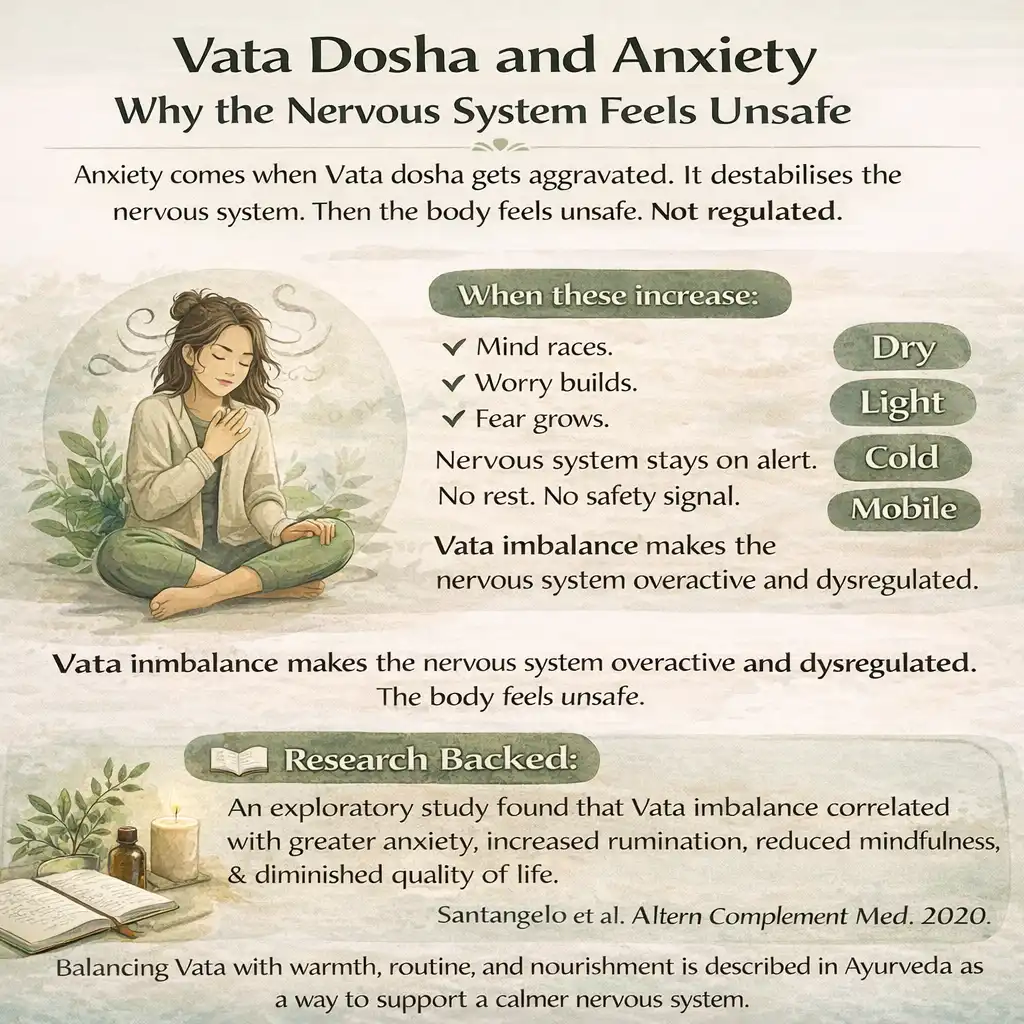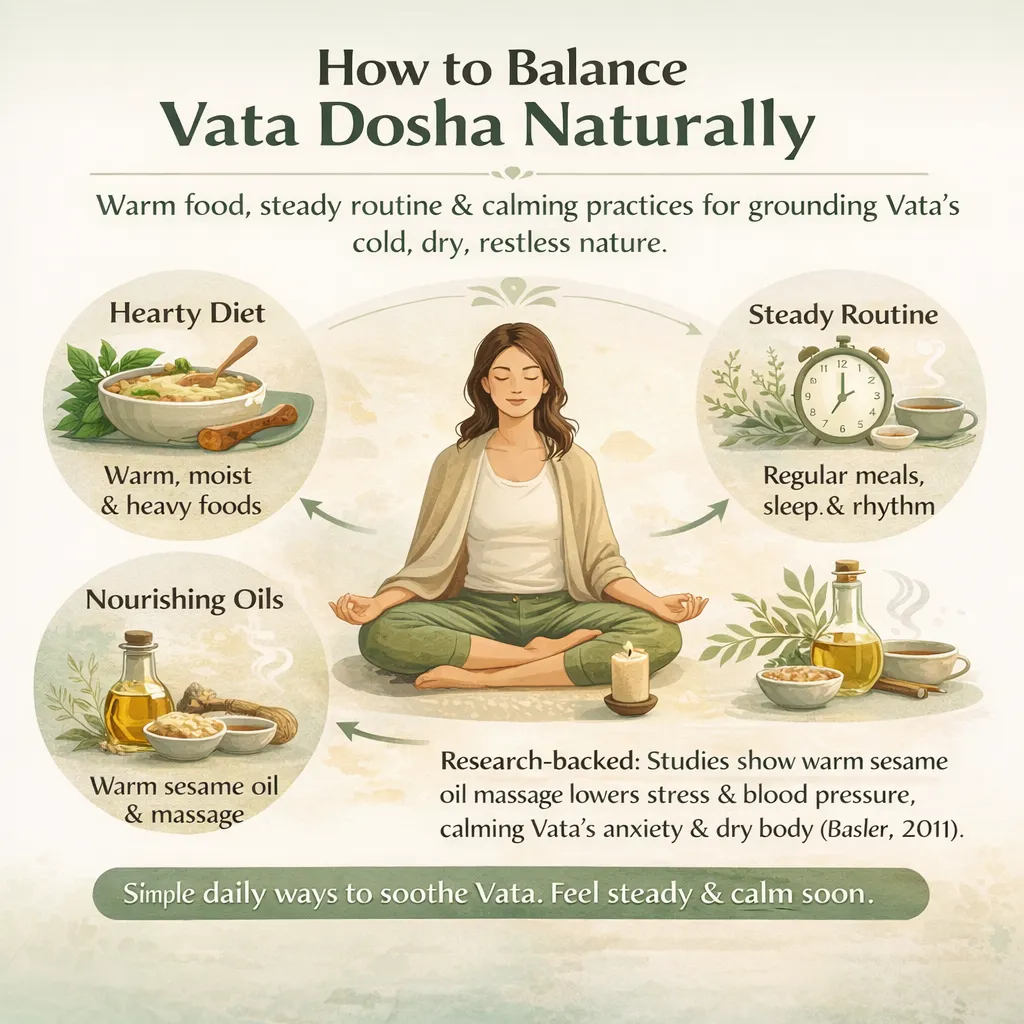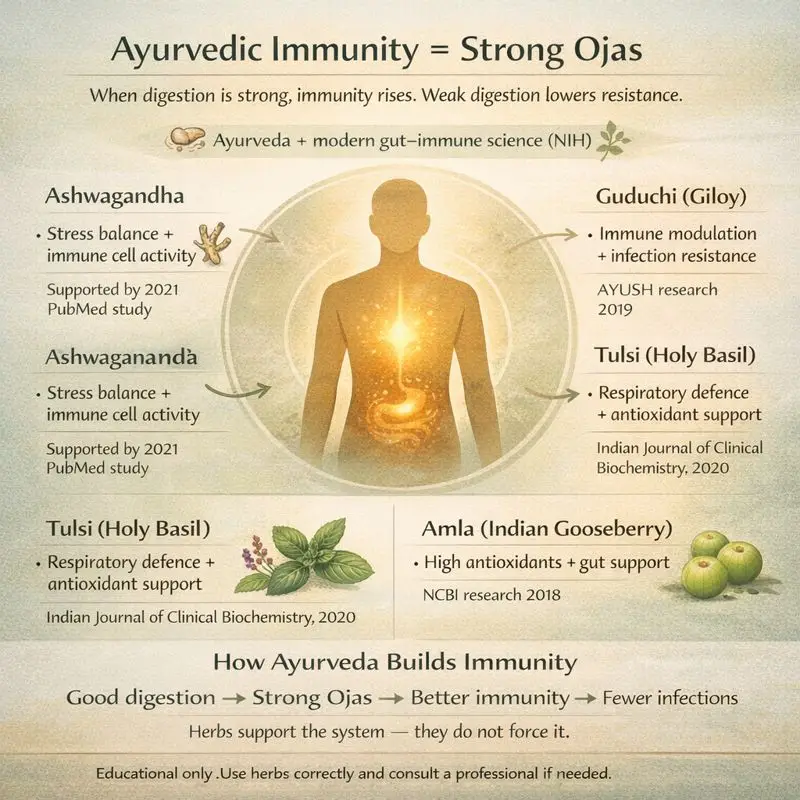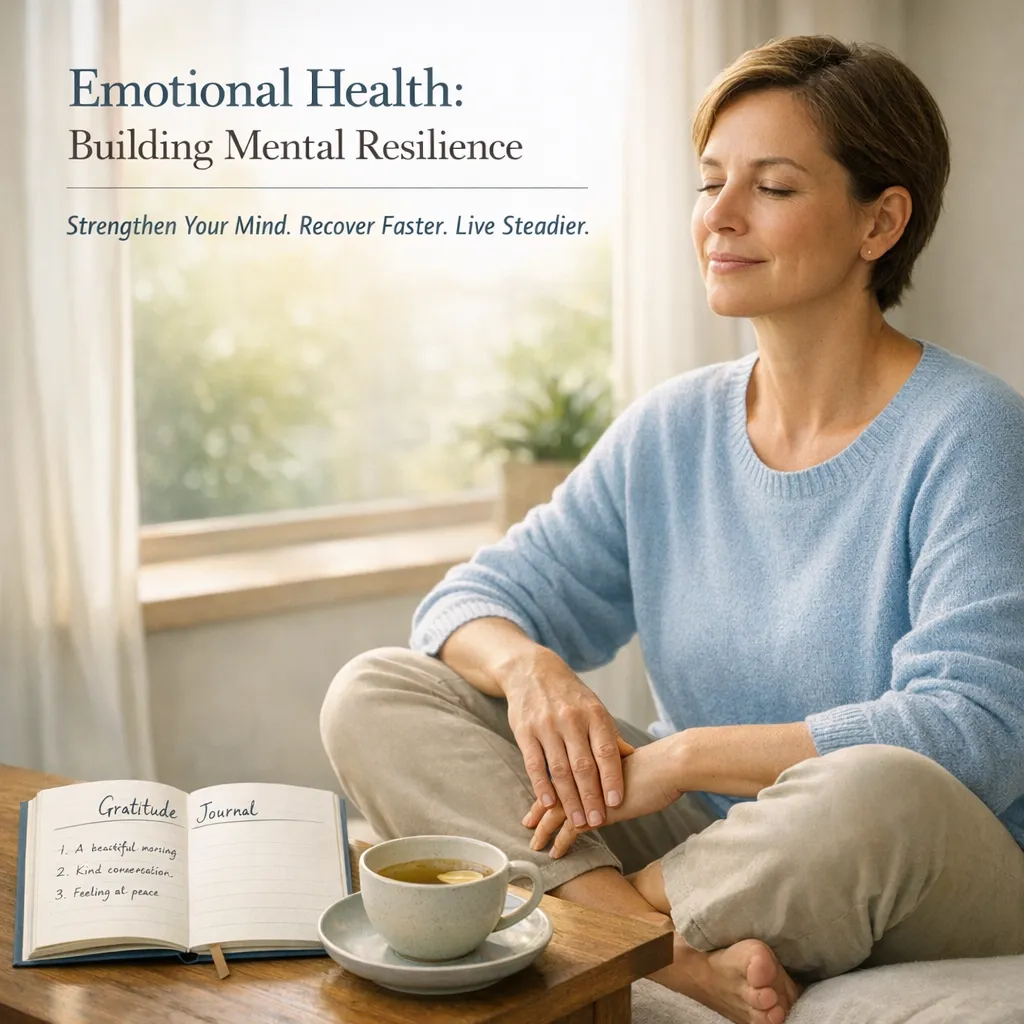Sometimes the mind runs too fast. The heart beats like a small drum inside chest. You feel breath stuck. This is anxiety. It can happen anytime—before sleep, before talk, before travel. Do not let it control the life. You can learn some natural ways to calm it down.
Start to listen your body first. Notice where tension hide—in shoulders, jaw, or stomach. (Mine always stays in neck.) Then breathe slow, like you sip air through straw. Simple changes help more than pills sometimes. Good food, morning walk, and steady sleep keep body strong so mind can rest.
There are 7 proven natural anxiety relief remedies (we will see next). They don’t need expensive tools or doctor every time. Only need your patience and daily habit. So stay with me and try one by one later. It’s easy practice, like watering a small plant every day.
Table of Contents
ToggleWhat Is Anxiety and Why Natural Relief Matters
Anxiety is common now. It can come like a wave inside chest. Some feel nervous before exam, job, or even for no reason. This body and mind start running fast. Heart beats more. Breath shorter. And sleep go away. Natural way can help (without heavy medicine). Let’s learn simple things that calm nerves and make mind easy again.
What Is Anxiety
Anxiety is body reaction to danger. But here danger not real. It just come from thought. Mind keeps warning body again and again. So you start sweating, shaking, or not focusing. It feels like storm inside. This kind of anxiety not always bad, but when it stay long, it drain energy.
Why Natural Relief Matters
- Less Side Effect: Herbs and breath work don’t harm stomach or liver (like some tablets do).
- Whole Body Calm: Natural method relax both mind and muscle.
- You Control: You can do anytime—no doctor needed each day.
Simple Natural Ways
- Deep Breath: Sit straight. Inhale slow like smelling flower. Exhale like blowing candle. Do 5 times.
- Herbal Tea: Chamomile, ashwagandha, or tulsi tea calm body nerves.
- Walk Daily: Move body 20 minute. Walking clear trapped thought.
- Sleep Right: Keep phone away before bed. Let mind rest natural.
Can You Really Manage Anxiety Without Medication?
Yes, you can manage anxiety without medicine. But it takes daily practice and slow changes in how you handle your body and thoughts. Do not expect magic. Work with small steps. Some days you fail, some days you win. Keep doing.
- Breathe the Simple Way
- Sit straight (not stiff).
- Inhale slow through the nose, count to 4.
- Hold breath for 2, then exhale soft like you blow on soup.
- Do five rounds. This calm the racing mind.
- Move the Body
- Walk early morning when the air still clean.
- Stretch arms above head (as if push away worry).
- Do simple yoga or qigong style move. It release tight chest and shoulder.
- Talk and Write
- Share with close person.
- Write what you feel (even you tear the paper later).
- Less holding inside, less pressure.
- Eat and Sleep Calm
- Avoid coffee, cigarette, late-night scroll.
- Eat warm food, rest same hour each night.
- Small discipline work better than any pill sometimes.
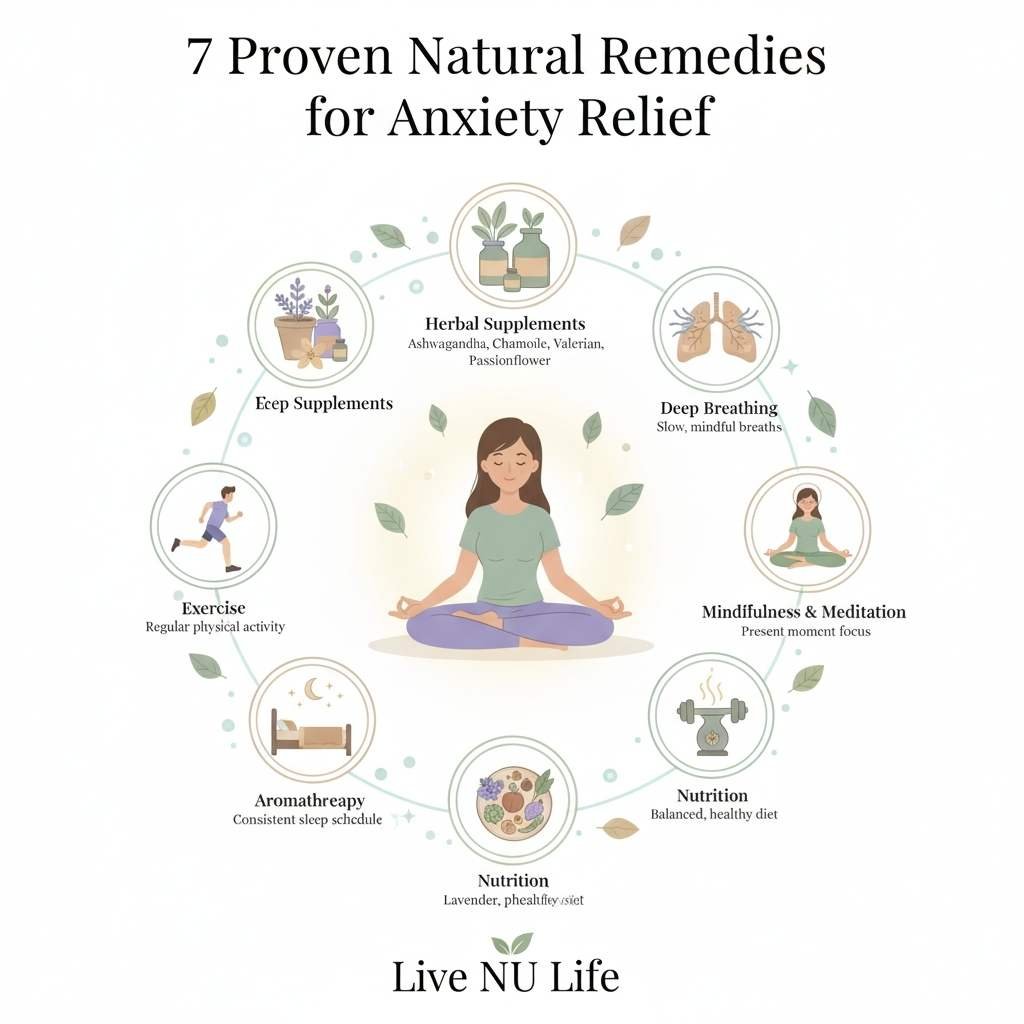
7 Proven Natural Remedies for Anxiety Relief
Anxiety can come like a sudden wave. You feel chest tight, mind run fast, sleep go away. Many people rush to pills, but nature have her own medicine too. These simple remedies help calm the body and quiet the mind. Try one or two (not all at same time). See what work for you.
1. Herbal Supplements for Calmness
Start with herbs that support nerves. These have long history in calming the anxious mind.
- Ashwagandha – This ancient herb from Ayurveda helps your body adapt to stress. Take capsule in morning (not before sleep, it may give energy).
- Chamomile Tea – Drink warm cup before bed. Help body relax, reduce mild anxiety.
- Valerian Root – Good for night rest. Smell a bit strong (like old socks!) but work well for many.
- Passionflower – Take this when your heart race or when worry come sudden.
(Always check with doctor if you take other medicine.)
2. The Power of Deep Breathing
When anxiety rise, breath become short and shallow. Bring it back slow.
- Sit tall, shoulders loose. Inhale through nose for 4 counts. Hold for 2. Exhale through mouth for 6.
- Imagine blowing out the candle slow. Feel stomach move, not chest.
- Do for 3 minutes. Repeat until heart feel steady again.
(This kind breathing calm nervous system. You can do anywhere.)
3. Mindfulness and Meditation Techniques
Mindfulness mean stay with the moment. Not future worry or past regret.
- Start with 5 minutes. Sit quiet. Watch the breath. If mind wander, bring back to inhale-exhale.
- Use guided meditation on phone app if you prefer help.
- Be patient. Not about perfect silence. Just notice thought, then let go (like leaf float on water).
With time, mind become less noisy, more aware.
4. Exercise: The Natural Stress Buster
Move body to move the mood.
- Brisk walk 20–30 minutes. Outside is best (sunlight give vitamin D and happiness boost).
- Try yoga, cycling, even dancing. Sweat a little, smile more.
- Don’t push too hard. Gentle regular movement calm better than rare extreme workout.
(When body strong, mind follow.)
5. The Role of Nutrition in Easing Anxiety
What you eat change how your brain feel.
- Eat more: vegetables, brown rice, bananas, nuts, seeds, fish (omega-3 help a lot).
- Avoid: too much coffee, sugar, and alcohol. They spike and crash mood fast.
- Stay hydrated. Dehydration increase irritability (many forget this one).
Simple food = Stable mood.
6. Aromatherapy and Essential Oils
Smell has direct link to emotion center of brain.
- Use lavender oil for sleep and calm. Put few drops on pillow or wrist.
- Bergamot oil lift mood (very nice for afternoon fatigue).
- Frankincense help deep breathing during meditation.
You can diffuse, or mix with carrier oil for massage (never put directly on skin without mixing).
7. Sleep and Relaxation Rituals
Anxious mind don’t rest easily. So train body for quiet.
- Go to bed same time nightly. Keep phone away (blue light disturb brain).
- Drink warm milk or chamomile before bed.
- Do light stretch or slow breath before sleeping.
- Keep room dark, little cool (body rest deeper that way).
Sleep heal everything—mood, focus, heart, and anxiety.
Final Tip: Small steps matter more than big effort. Start with breath, a walk, or one herb tea. Then add another habit slowly. Anxiety will not vanish in one day, but with steady care, body start to trust calm again.
(Practice daily, not only when panic come.)
Daily Lifestyle Habits That Reduce Anxiety Naturally
Anxiety eats energy fast. It makes your chest tight, mind tired, and sleep broken. But daily small habits can heal it. No need for strong medicine or long meditation (if you don’t like that). Just change few things one by one.
Start the Morning Calm
- Wake early when air is cool. Sit quietly for 5 minutes (no phone).
- Drink warm water with lemon. Feel it go down the throat. It calm stomach too.
Move the Body Every Day
- Walk slowly first, then faster.
- Stretch arms, shoulders, neck (like shaking dust off).
- If mind chatter start, breathe deep through nose, out from mouth.
Eat Light and Natural
- Avoid too much sugar and spice. It make heart run fast.
- Eat more fruits, rice, dal, nuts. Keep small meal but regular.
Sleep Simple and True
- No heavy talk or screen before bed.
- Lie down like resting cloud. Breathe slow. Let body sink and stop thinking.
Foods That Help vs. Worsen Anxiety
Anxiety is not only in the mind. It also live in the gut (yes, your stomach feels it first). Some foods calm it, some make it worse. So if your heart race or you can’t sleep well, check what you eat first. Change food, and you may feel a little peace back.
Foods That Help Anxiety
- Eat banana and oats. They boost serotonin, the “feel good” thing in your brain.
- Try chamomile tea. Drink it slow before sleep (like a warm hug inside).
- Dark chocolate (small piece). Help balance stress hormone.
- Leafy greens. Give magnesium which relax muscles and nerves.
- Eat nuts and seeds. Calm heart beats and stop shakiness.
Foods That Worsen Anxiety
- Avoid coffee and energy drinks. They make your heart jump fast.
- Skip sugary snacks. They lift mood quick then drop it low.
- Alcohol or junk food. May look relaxing, but the next day—mind feels cloudy.
When to Seek Professional Support Alongside Natural Remedies
Many people start with home remedies when they feel sick. It’s okay. Herbs, warm teas, oil massage — all help for small issues. But not always enough. Sometimes, body give clear sign that it need more help. Learn to see these signs early. Don’t wait too long. Natural way is good, but professional treatment save time and pain.
When Natural Remedies Need Support
- Pain not going away
If same joint or stomach pain stays long (more than few days), stop self-care. Visit clinic. - Sudden weakness or dizziness
Don’t ignore. Your blood sugar or pressure may drop. Call doctor fast. - Breathing problem or chest tightness
Even mild one can be serious. Go hospital at once. - If herbs cause rash or nausea
Your body saying “no.” Stop that remedy right away. - Fever more than 3 days
Natural treatment can help rest, but infection need test and medicine.
Check out these related articles to expand your knowledge:
Build lifelong vitality with 10 Daily Habits to Extend Your Healthspan in 2025.
Discover evidence-backed methods in Science-Based Longevity Protocols for Optimal Aging.
Enhance your longevity naturally with Best Longevity Supplements: Evidence-Based Guide.
Learn how to age gracefully with Anti-Aging Wellness: Your Complete 2025 Guide.
Strengthen your body at the cellular level through Cellular Health Optimization.
Beat burnout with 5 Natural Stress-Busting Techniques That Actually Work.
Discover proven ways to calm your mind in Stress Management Solutions.
Reclaim your focus and mental clarity with Digital Detox: Reclaim Your Mental Peace in 2025.
Frequently Asked Questions
- Take deep breath. (Inhale slow, exhale longer.)
- Splash cold water on face. It reset brain a bit.
- Move body. Walk 5 minutes or stretch arms wide.
- Warm chamomile tea help a lot.
- Lemon balm or green tea also good.
- Avoid too much coffee (it make heart race).
- Stop looking at phone 1 hour before bed.
- Try light breathing or count backward slowly.
- Keep room dark and little cool (like cave feeling).
- Eat banana, nuts, or yogurt.
- Omega-3 food like fish calm nerve.
- Avoid sugar spikes, it make mood swing.
- Stand up, stretch neck and shoulder.
- Focus on one small task, not ten.
- Breathe before replying email (really help).
References
American Psychiatric Association. (2013). Diagnostic and statistical manual of mental disorders (5th ed.). American Psychiatric Publishing.
Amsterdam, J. D., Li, Y., Soeller, I., Rockwell, K., Mao, J. J., & Shults, J. (2009). A randomized, double-blind, placebo-controlled trial of oral matricaria recutita (chamomile) extract therapy for generalized anxiety disorder. Journal of Clinical Psychopharmacology, 29(4), 378-382.
Aucoin, M., Cooley, K., Knee, C., Fritz, H., Balneaves, L. G., Breau, R., … & Schweizer, I. (2014). Fish-derived omega-3 fatty acids and prostate cancer: A systematic review. Integrative Cancer Therapies, 13(1), 32-45.
Bandelow, B., Michaelis, S., & Wedekind, D. (2017). Treatment of anxiety disorders. Dialogues in Clinical Neuroscience, 19(2), 93-107.
Bystritsky, A., Khalsa, S. S., Cameron, M. E., & Schiffman, J. (2013). Current diagnosis and treatment of anxiety disorders. Pharmacy and Therapeutics, 38(1), 30-57.
Kenda, M., Naculini, P., Toplak, N., Čater, M., & Žegura, B. (2022). Medicinal plants used for anxiety, depression, or stress treatment: An update on their pharmacology, mechanism of action and toxicity. Molecules, 27(18), 6021.
Lakhan, S. E., & Vieira, K. F. (2010). Nutritional and herbal supplements for anxiety and anxiety-related disorders: Systematic review. Nutrition Journal, 9(1), 42.
Medical News Today. (2025, July 15). 10 natural remedies for reducing anxiety and stress. Medical News Today.
National Institute of Mental Health. (2022). Anxiety disorders. U.S. Department of Health and Human Services.
Otieno, B. A. (2019). Efficacy and pharmacology of herbal remedies for stress and anxiety: A comprehensive review. Advances in Health and Intelligence, 1(1), 1-5.
Sarris, J., McIntyre, E., & Camfield, D. A. (2013). Plant-based medicines for anxiety disorders, Part 2: A review of clinical studies with supporting preclinical evidence. CNS Drugs, 27(4), 301-319.
World Health Organization. (2017). Depression and other common mental disorders: Global health estimates. World Health Organization.
Zhang, W., Yan, Y., Wu, Y., Yang, J., Wang, W., & Li, W. (2022). Medicinal herbs for the treatment of anxiety: A systematic review and network meta-analysis. Pharmacological Research, 179, 106204.
Zick, S. M., Wright, B. D., Sen, A., & Arnedt, J. T. (2011). Preliminary examination of the efficacy and safety of a standardized chamomile extract for chronic primary insomnia: A randomized placebo-controlled pilot study. BMC Complementary and Alternative Medicine, 11(1), 78.

